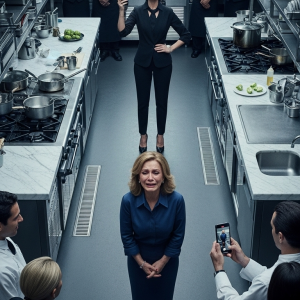The aroma of cinnamon and roasting turkey was supposed to smell like love. For thirty years, it had. But that Thanksgiving, the air in my son Michael’s meticulously decorated home was thin and cold, and every scent was laced with the bitter perfume of anxiety.
My granddaughter, Chloe, was getting married in the spring. Her fiancé, James Crestwood, and his parents, Arthur and Eleanor, were the guests of honor. The Crestwoods were, as my daughter-in-law Laura had breathlessly informed me, “old money.” Their name was etched onto university buildings and museum wings. They sailed in the summer and skied in the winter, and their world was a galaxy away from mine.
I had arrived with my pecan pie, the one Michael had called his favorite since he was a boy. I placed it on the granite countertop, next to a catered spread of impossibly perfect side dishes. Laura gave me a tight, fleeting smile before turning to fuss over Eleanor Crestwood’s cashmere wrap.
I watched them from the kitchen doorway. Michael, my son, a successful architect who now wore suits that cost more than my monthly rent, was laughing at something Arthur Crestwood said. He looked polished, powerful, and utterly terrified of making a misstep. I saw the way he held his wine glass, the careful, practiced way he nodded. He was performing, and my presence was an unscripted, unpredictable element.
After an hour of strained small talk, where my answers about my life were met with polite, blank stares, Michael asked to speak with me in his study. The room was lined with books he’d never read and smelled of leather and ambition.
He closed the door, the click of the latch sounding unnervingly final.
“Mom,” he began, avoiding my eyes. “We need to talk about the wedding.”
“It’s going to be beautiful, Michael. Chloe is so happy.”
“She is. And we want to keep it that way.” He took a breath, the way a person does before diving into icy water. “The Crestwoods… they’re a different class of people. They have certain… expectations. The wedding is going to be a significant social event.”
A cold knot formed in my stomach. I knew where this was going. “And?”
He finally looked at me, and his eyes were filled with a pained, agonizing shame that he was directing entirely at me. “And your job, Mom. My colleagues and clients will be there. All of Arthur’s business partners. This place isn’t for people like you.”
People like you. The words hung in the air, thick and suffocating. For thirty years, I had been a janitor at the city hospital. I had mopped floors, cleaned up messes others left behind, and held the hands of frightened patients in the dead of night. It was honest, grueling work. It was the work that had paid for Michael’s first drafting table, his university tuition, the down payment on this very house.
“Your job embarrasses us,” he said, the words a low, painful rush, as if saying them quickly would lessen their sting. “Laura and I… we just think it would be better if you weren’t there. It would create a… distraction.”
I looked at my son, at the man I had raised, the boy whose scraped knees I had bandaged and whose nightmares I had soothed. I searched his face for a trace of the child I knew, but he was gone, replaced by this stranger who was ashamed of me.
My heart didn’t just break; it atomized. The pain was so immense, so absolute, that it became a kind of stillness. There was nothing to say. Arguing would be begging. Crying would be a weakness he couldn’t afford to see. Defending my life’s work would be pointless because he had already passed his judgment.
So I gave him the only thing I had left: my dignity.
I straightened my back and met his gaze without flinching. My voice, when it came, was a quiet, even whisper. “I understand.”
I walked out of the study, past the silent, opulent living room, and picked up my coat. I didn’t take my pie. Laura saw me at the door, her expression a mixture of relief and fleeting guilt. “Sarah, you’re not leaving already?”
“I’m not feeling well,” I said, the lie tasting like ash. “Give my love to Chloe.”
I stepped out into the cold November air and walked away from the warm, golden light of my son’s house, leaving my heart behind on his perfectly polished floor.
My small apartment was a refuge. It was a testament to a life of careful budgeting—clean, orderly, but sparse. Here, I wasn’t an embarrassment. I was just Sarah.
Those five days were the longest of my life. I went to work. The familiar scent of antiseptic and floor wax was a comfort. At the hospital, I wasn’t an awkward presence at a fancy dinner party; I was part of a team. I was “Sarah,” the one the night-shift nurses saved a cup of coffee for, the one who knew how to fix the cranky vending machine on the third floor, the one who would sit with elderly patients when they couldn’t sleep.
“You’re a sight for sore eyes, Sarah,” a young nurse named Maria told me one night, as I cleaned up a spill in the emergency room. “You make this place feel more human.”
Her words were a balm on a wound my own son had inflicted. Here, my work had value. My hands, calloused and clean, brought order to chaos. How could that be a source of shame?
On Saturday, needing to clear my head, I decided to tackle the hall closet, a space filled with the ghosts of a life before this one. Tucked away at the back was a box of my late husband David’s things. He had been the dreamer, the architect of a life we never got to live. Our plan had been to open a custom woodworking shop. He had the talent; I had the head for business. We were just getting started when a drunk driver ran a red light, and all our blueprints turned to dust.
I ran my hand over his old tools, his worn leather apron. And then I found it: a thick folder labeled “Crestwood Proposal.”
My breath caught. I sat on the floor and opened it. Inside were detailed plans, cost analyses, and letters from thirty years ago. David had been trying to secure a partnership with a new development firm, Crestwood Holdings, to provide custom cabinetry for their luxury homes. It was his big break.
The letters were full of hope and excitement. And then, the last one. It was a single, curt page from a young Arthur Crestwood, abruptly terminating their discussions. He stated he was pursuing a “more streamlined, cost-effective” direction. Tucked behind it was a newspaper clipping from six months later, announcing Crestwood Holdings’ incredible success, highlighting their “signature, artisan-quality cabinetry.”
It was David’s designs. I knew them as well as I knew my own hands. Arthur Crestwood had stolen his dream, his entire business plan, and used it to build his empire. The financial ruin that followed had been catastrophic. It was why I had taken the first job I could find—a janitor position at the hospital that offered stability and a steady paycheck. It was the only way to keep a roof over ten-year-old Michael’s head.
A bitter, cold rage, an emotion I hadn’t felt in decades, flooded me. Arthur Crestwood wasn’t just “a different class.” He was the architect of my family’s collapse. And my son, my own son, was so desperate to impress this man that he had cut me out of his life. The irony was a physical pain.
I put the papers back in the box and pushed it to the back of the closet. What was the point? Telling Michael now would seem like a desperate, vindictive act. A sour-grapes story from the mother he’d already cast aside. He had made his choice.
The phone rang on Sunday night. It was Chloe, my granddaughter.
“Grandma? Are you okay? Dad said you were sick. I was so worried.”
“Just a little bug, my love. I’m feeling much better,” I lied, my voice thick.
“Oh, good. James and I were hoping you could come over for dinner tomorrow night. Just us. His parents have a charity gala. I… I really want you to get to know him properly. He’s a good man, Grandma.”
The sincerity in her voice was a gut punch. “I’d love that, sweetheart.”
I knew I was walking back into the fire, but for Chloe, I would do anything.
Chloe’s apartment was a small, bright space filled with art and mismatched furniture. It felt warm and real in a way her parents’ house never did. James Crestwood was a surprise. He was polite, kind, and seemed genuinely nervous to meet me. He had his father’s looks but none of his cold, corporate polish.
“It’s an honor to finally meet you, Mrs. Miller,” he said, shaking my hand firmly. “Chloe talks about you all the time.”
We sat down for dinner, and for the first time, I felt a flicker of hope. James was a good man. He talked about his passion for history, not finance, and he listened—really listened—when I spoke.
As Chloe cleared the plates, James turned to me. “Michael mentioned your late husband was a businessman. David, right?”
I nodded, my heart giving a familiar pang. “He was a woodworker. Incredibly talented.”
“That’s fascinating,” James said, leaning forward. “My dad started in development. He had this one big break early on, a deal with a woodworker. He always said the man was a true artist but a terrible businessman. It’s what launched Crestwood Holdings. Dad said he learned a valuable lesson: great ideas are worthless without ruthless execution.”
The air left my lungs. My hands, resting on the table, curled into fists. “What was the name of his company?” I asked, my voice dangerously quiet.
“Oh, gosh, I don’t know. ‘Miller’s something?’ My dad just called him ‘the dreamer.’ It’s a shame what happened to him. Lost everything, I heard.”
He said it with such casual, inherited arrogance. A story passed down from father to son, polished over the years to become a lesson in business acumen instead of what it truly was: a tale of theft and betrayal.
I looked at this kind young man, who had no idea the foundation of his comfortable life was the rubble of mine. I looked at my granddaughter, returning from the kitchen with a smile. And I knew I couldn’t stay silent. Not anymore.
“James,” I said, my voice steady now, infused with the cold clarity of anger. “The man your father calls ‘the dreamer’ was my husband, David Miller. And your father didn’t just outsmart him. He stole his business plan, his designs, and his future. The reason I’ve worked at a hospital for thirty years is because Arthur Crestwood left my husband with nothing but debt and a broken heart.”
Chloe gasped, dropping a stack of plates. They shattered on the floor. James’s face went white as a sheet.
“That’s… that’s not possible,” he stammered.
“I have the proposal letters,” I continued, standing up. “The designs. The letter from your father terminating the partnership. And the newspaper article six months later celebrating his success, built on my husband’s work. My son was so ashamed of my job that he uninvited me from my own granddaughter’s wedding, all to impress the man who forced me into that job in the first place.”
I turned to Chloe, my heart aching for the pain I was causing her. “I’m sorry, sweetheart. You deserve to know the truth about the family you’re marrying into.”
I left them there, amidst the shattered plates and the even more shattered silence. The drive home was a blur. I had done it. I had finally spoken the truth, and I had no idea what would happen next.
I didn’t have to wait long.
Two hours later, my phone rang. It was Michael. He didn’t say hello. His voice was a raw, choked whisper.
“Mom. Is it true?”
“Yes,” I said.
A terrible, ragged sob came through the phone. “I have his old files. I’m at the office. Chloe called me. I found the Crestwood file. It’s all here. The letters. His journal entry from the day after… Oh, God, Mom. What have I done?”
The next morning, my doorbell rang insistently. I opened it to find Michael standing there. He looked like he had been through a war. His eyes were red-rimmed, his expensive suit was rumpled, and his face was a mask of self-loathing. He was furious, but this time, the fury was for himself, and for me.
“He destroyed him,” Michael said, his voice shaking with rage. “Crestwood built an empire on Dad’s grave, and I was… I was kissing his ring. I was so eager for his approval I threw you away.” He stepped inside, his shoulders slumping. “I was ashamed of you for working your fingers to the bone, when you were only doing it because that man stole everything from us. How can you ever forgive me?”
I looked at my son, no longer a stranger, but a broken man who had finally seen the truth.
“Forgiveness is a process, Michael,” I said softly. “But we can start right now.”
The day of the wedding arrived under a bright, unforgiving spring sky. The church was a cathedral of white roses and hushed whispers. I sat in the front pew, next to Michael. He had insisted. Laura sat on his other side, her face pale, having been told the entire story. She hadn’t spoken to me, but she had looked at me with a new, humbled respect.
The Crestwoods sat across the aisle, radiating a cold, stiff dignity. Arthur Crestwood had not acknowledged me, but the look he shot Michael was venomous.
The ceremony was beautiful. Chloe and James, caught in the crossfire of their families’ past, looked only at each other. Their love was the one pure, untainted thing in the room.
At the reception, held at the Crestwood’s palatial country club, the tension was thick enough to cut with a knife. After the first dance, Michael took the microphone for the father-of-the-bride speech. A hush fell over the room. Arthur Crestwood leaned back in his chair, a smug smile on his face, expecting a toast full of flattery.
Michael looked out at the crowd, his gaze finally landing on Arthur.
“A toast,” Michael began, his voice clear and steady, “to new families, and to the foundations they are built on.” He raised his glass. “Arthur, you once told me that a man is measured by what he builds. I used to believe you.”
He paused, letting the silence stretch. “But I’ve recently learned a more important lesson. A person isn’t measured by what they build, but by what they are willing to sacrifice for the people they love. My father, David Miller, was a builder. He built furniture, he built a business, and he built a family. He was a man of integrity.”
Michael then looked directly at me, his eyes shining with tears. “My mother, Sarah, is also a builder. After my father’s life and work were stolen from him, she built a new life for us from the ashes. She worked for thirty years in a job that many would look down on, not for herself, but for me. She sacrificed her own dreams so I could have mine. She is the strongest, most honorable person I know. Her hands may be rough from labor, but her soul is clean. That, Mr. Crestwood, is a foundation you know nothing about.”
A collective gasp went through the room. Arthur Crestwood’s face was a mask of fury.
Michael set his glass down. He walked over to the head table and picked up a small, framed object—a gift from Arthur. It was the first dollar Arthur had ever earned.
“I believe this belongs to you,” Michael said, his voice low and cutting. He placed the frame in front of Arthur. “Along with all the others you built your fortune on.”
He then walked back to our table, took my hand, and helped me to my feet. Together, we walked over to Chloe and James. Chloe was crying, but she was smiling. James looked at his father with an expression of profound disappointment before turning and hugging me tightly.
“I am so sorry, Sarah,” he whispered.
“This isn’t your fault, James,” I told him.
The party continued, but the power in the room had irrevocably shifted. The Crestwoods were suddenly social pariahs in their own kingdom. My son, in one quiet, devastating speech, had chosen integrity over influence, love over legacy.
We didn’t stay long. As we walked out into the cool evening air, Michael slipped his arm around me.
“The house is yours, Mom,” he said quietly. “Whenever you’re ready. I’ll be staying in a hotel for a while. I… I need to figure out how to be a son you can be proud of again.”
I stopped and looked at him. “Michael, I have always been proud of you. But today, for the first time in a long time, I see your father in you.”
And that, I knew, was the truth that mattered. The road back would be long, but for the first time, we were walking it together.




